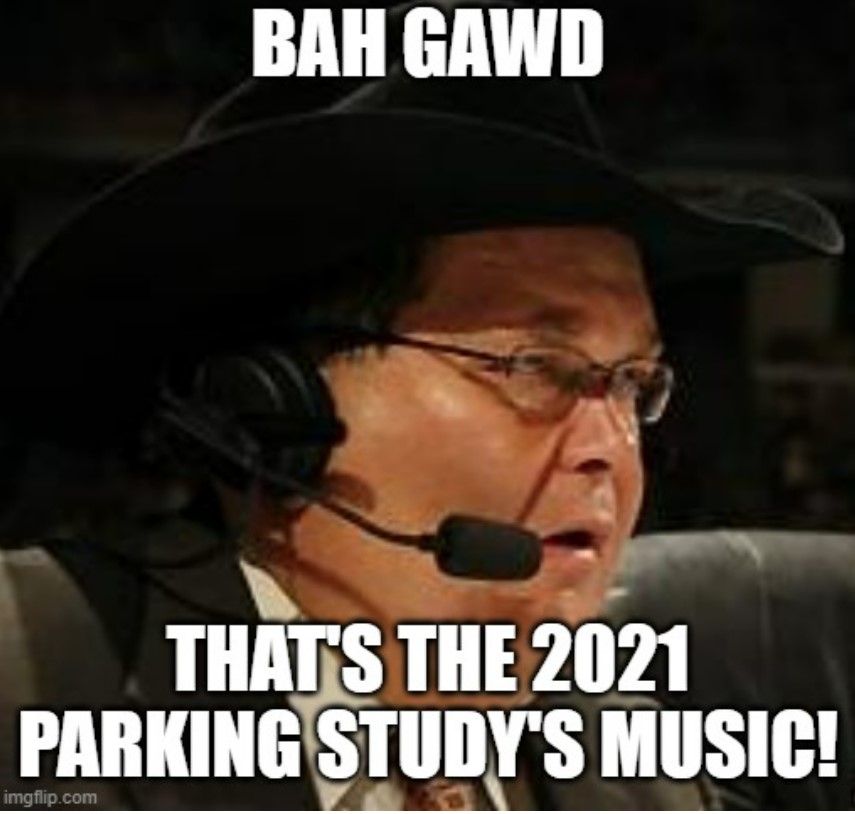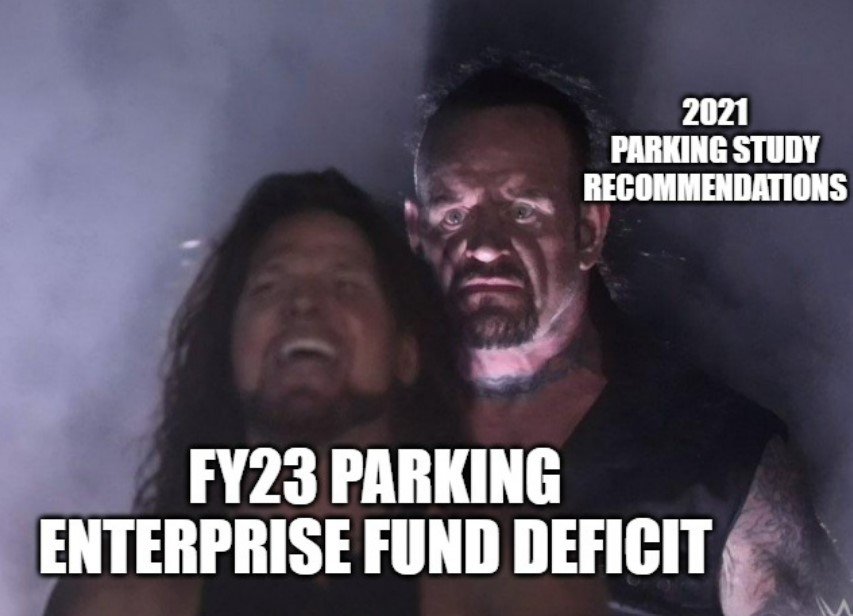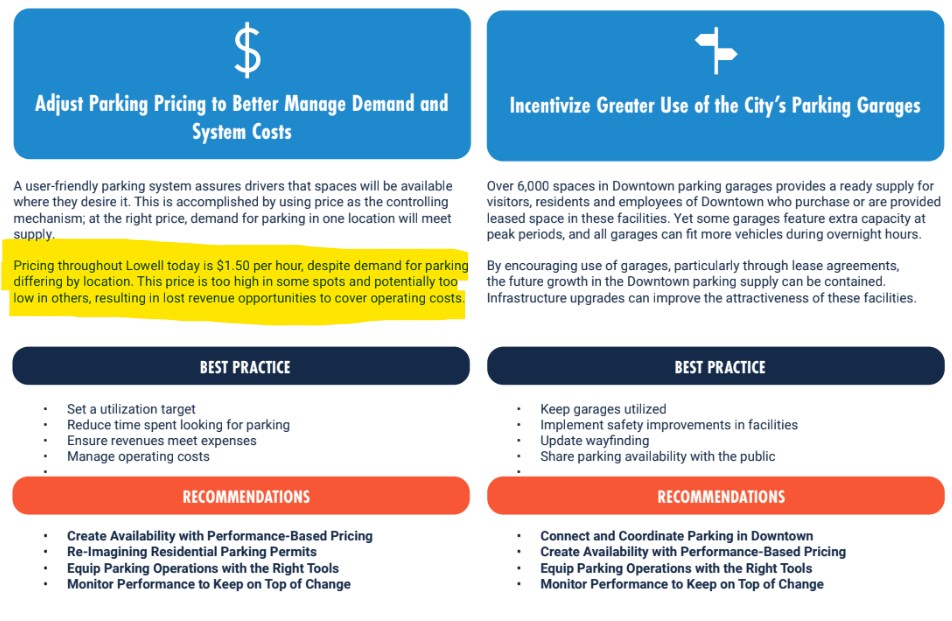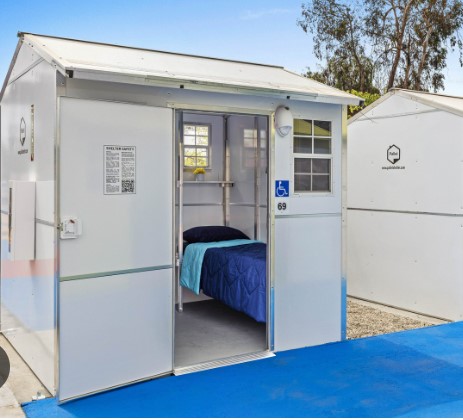Government was happening last night – here’s my highlights:
1. Gonna Need Some Money for Parking

Last Thursday, some crackpot had a post about parking wherein the City’s Comprehensive 2021 Parking Study was referenced. The timing couldn’t have been better as last night the council was asked to vote on a transfer of $2,834,616.17 from the city’s “rainy day” stabilization fund to the parking enterprise fund. It’s been raining cats and dogs in the world of parking lately. As per the request from the Manager:
“[T]he current retained earnings in the parking enterprise are insufficient to support the operating deficit of the FY2023 operations. Since the COVID-19 pandemic, the city has seen a significant decrease in the fund balance of the Parking Enterprise fund, directly proportional to the lack of economic activity in and around the downtown central business district e. The enterprise fund has also had an increase in expenditures, driven primarily by the debt service on the newly constructed Hamilton Canal Innovation District (‘HCID’) garage.”
An enterprise fund is a self-supporting government fund that sells goods and services to the public for a fee. These fees should, in theory, cover all of the expenses of the enterprise. However, our parking enterprise fund is broken in that we are losing money, and are projected to keep losing money in years to come. Thus the need for a transfer of $3,000,000 to keep the ship afloat. The vote passed 11-0.
It was clear last night that councilors and the management team are on the same page in that significant changes to the way we manage parking are necessary. Arguably, the city has kicked the can for too long on parking. Our equipment has fallen into disrepair and our pricing structure is out of whack. Enter the 2021 Comprehensive Parking Study:

About two years ago, during the Donoghue administration, the city accepted a $225,000 Housing Choice Grant award from the Executive Office of Housing and Economic Development (EOHED) to formulate a long-term plan to better manage our parking supply. Again, I suggest you check it out as it is full of data and recommendations worthy of attention. One of the key recommendations was to “adjust parking pricing to better manage demand and system costs” and to “Incentivize greater use of the city’s parking garages:”

The garages, currently, are money pits. However, despite shoddy equipment and an under-staffed enforcement division, the on-street parking program turns a “profit.” As such, to see our way out of this mess, we need to bump up the prices of the on-street program during periods of high demand (known as “dynamic pricing”), and entice more people to use the garages. A key to enacting such a program is the receipt of new parking kiosks. Terry Ryan, the City’s Parking Director advised the counsel that he is very close to executing a contract that will bring new equipment to the city. Once we have this new technology in place, the pieces of parking reform can start to fall into place. This will include better pricing, better enforcement, a better user experience, etc.
Councilor Robinson noted that unless we turn things around, we could be looking at another LeLacheur Park situation where the city will be forced to sell a liability (one or more garages). Councilor Yem suggested that we consider privatization of the parking system. I think we should tap the brakes on this type of talk. Let’s try enacting some reforms before we look at selling public assets to private interests. In addition, Chicago privatized it’s parking system, the taxpayers got screwed and investors got rich.
However, there is a lesson we can learn from the private sector. The reason private interests make money on parking is that they are not as sensitive as politicians to the backlash that comes with raising rates. For example, the memo attached to last night’s vote reminds us of the following:
In September of 2017, a rate proposal was made to the City Council finance subcommittee,
including a recommendation to gradually increase the market rate for garage passes to $145 per
month by FY2021, as well as to eliminate or reduce a number of existing discounts for certain
groups of users, such as downtown residents, and large (20+) groups. At the time, it was
forecasted by the finance department that, without a significant rate increase, the parking
enterprise would become insolvent by FY2021. It also proposed creating a number of new
parking products such as a “commuter special”, an “overnight parking special”, and fees for
long-term storage of vehicles. A number of members of the public appeared at the subcommittee
to express concerns with the proposal and, after deliberation by the subcommittee and the
Council, the Administration brought forward a significantly reduced price increase which was
eventually approved by the City Council after a public hearing on June 12, 2018.
In 2017, our politicians were willing to take a financial loss to appease voters. In addition, last night, it was revealed that there are currently about 5,000 monthly garage pass holders. Only about 370 pay the full retail rate. The rest take advantage of discounts – currently subsidized by taxpayers.
It should be clear that the dynamic we have created is both absurd and unsustainable. Our hand is being forced to adapt and rectify the sins of the past. This is a good thing. We should all look forward to the difficult conversations that will be coming over the next few months as we seek to claw our way out of this mess. Otherwise, in the near future, you could be buying Sal Lupoli or someone like him a new beach house with your parking fees.
2. Multiple Traffic Issues
The DPD, and specifically, Elizabeth Oltman, our Transportation Engineer, have been busy tackling the large number of traffic related issues and motions that have come forward lately. Last night there were several such issues on the agenda. Instead of spending my time wisely, I made a table:
| Motion | Can/Should We Do It? | Reason(s) Cited |
| Mayor Chau – Request City Manager Investigate The Installation Of A Crosswalk On Lawrence Street Between Rogers Street And Swift Street. | No | Four pedestrians were observed crossing Lawrence Street during the evaluation period. No two pedestrians crossed in the same location, therefore, no “desirable” crosswalk location was able to be identified. (it really says this) The installation of a mid-block crosswalk would remove an on-street parking space directly in front of a business. |
| Mayor Chau / Councilor Robinson Request City Manager Provide Update On The LPS Bus Stop Location On Barker/Billings Street For Signage And Stop Signs. | No on the stop signs, Yes on other measures | The intersection was studied in 2020 for an all-way stop control and was not found to meet the MUTCD required warrants at the time. A current plan includes the installation of chicanes along both blocks of Billings Street. The traffic calming program can be adjusted to include a curb extension at the intersection to provide a safe area for students to get on and off the school bus |
| Councilor Gitschier Request City Update the City Council On The Traffic Signal Located At the Intersection Of Merrimack And Worthen Street. | Update? = Sure. Changes = No | There are an acceptable number of vehicle crashes per year with no pedestrian crashes in the past five years. The MUTCD vehicular volume warrants are unlikely to be met. |
| Councilor Gitschier – Request City Manager Update The City Council On The Trial For Three Way Stop Signs At The Intersection Of Stedman Street and Westford Street. | Stop signs = No Permanent signals = Yes | All-way stop control will increase delays for the traffic along Westford Street, potentially causing additional driver frustration The installation of a traffic signal at the intersection is still recommended and warranted, and would reduce the number of vehicle crashes and provide a safer pedestrian crossing location. |
3. Homelessness Solutions Sought

Spend a few minutes on Lowell-centric Facebook and you will inevitably come across a comment wherein somebody wishes that the city would “do something about the homeless.” I find this frustrating. The city is trying – the evidence is there every week. The problem is that the issue is absurdly complex and goes far beyond what a municipal government can hope to accomplish. Nevertheless, like Sisyphus, we try.
This week there were several items of note: First, there was a motion response relative to a proposed “Summit Including Inviting Other Gateway Cities Representatives To Discuss Best Practices And Legislative Needs Around Homelessness.” A motion by Councilor Jenness “Requesting City Mgr. Have The Proper Department Provide Report On Progress Of Implementation Of The Winter Protocol Plan For Individuals And Families Experiencing Homelessness Within The City” and an interesting motion by Councilor Nuon:
“Have Appropriate Department Work With Volunteers To Raise Approximately 7 Thousand Dollars To Acquire And Erect A “Demonstration Cabin” To Show What Can Be Done To Shelter The Unhoused During Severe Winter Weather.”
The Nuon motion asks the city to facilitate private efforts to purchase a model “pallet shelter” that could be displayed so that residents could have a greater understanding of the options that exist to assist the unhoused.

The debate that followed largely focused on the logistics. Where will we put it (somewhere prominent – City Hall?), is the city paying? (No) Will someone actually live in it? (No). In the end, the motion passed 10-1 with Councilor Rourke in opposition on the grounds that the motion, as written, should not be before the city council.
I applaud the effort and am certain that it’s not going to hurt. As long as we keep pushing that rock, there is meaning in the effort.
4. The Rest
- The Council adopted a 25 MPH citywide speed limit ordinance that has been in the works for many months.
- There was an update from the Lowell Housing Authority on the recent flood caused by a water main break, as well as recognition of the many community members who have offered assistance.
- A vote passed adopting the minimum residential factor – whereby the commercial tax burden will continue to be greater than the residential tax burden.
- The manager requested a vote to approve emergency expenditure authorization due to the above-reference water main break. The vote was deferred and the matter was referred to the finance subcommittee at the suggestion of Councilor Jenness on the grounds that the proposed vote had no details as to the amount of spending sought, nor the categories of spending.

The parking revenue shortfall has been exacerbated by the mindless construction of 2 new garages in the Hamilton Canal Innovation District (one opened last year and the other smack in front the of the new court house.) it’s hard to comprehend the CC’s and admin’s infatuation with garages when alternate transportation modes are under utilized.